Greetings, Gardening Family…
Are you looking for a beautiful and eye-catching indoor plant for your home? I must say you cannot go wrong with the Alocasia Genus, especially with its beautiful cultivar plant Alocasia Polly. It has all its parent flairs but is more compact than its other family members (Alocasia Stingray , Alocasia Sarian ); therefore, it is perfect for small spaces.
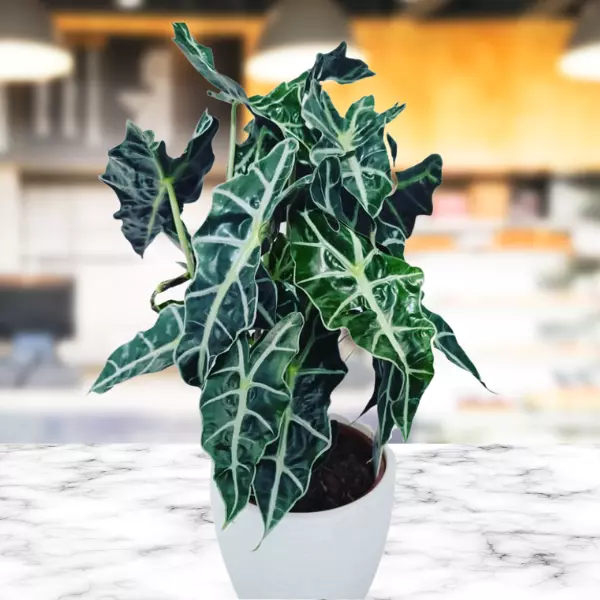
Allied Species: Alocasia Sarian, Alocasia Pink Dragon, Alocasia Lauterbachiana, Alocasia Silver Dragon, Alocasia Stingray, Alocasia Regal Shields, Alocasia Nebula, Alocasia Portora, Alocasia Cucullata, Alocasia Cuprea, Alocasia Maharani
Related Products
Products | Name | Check Price |
Organic Perlite for Plants | ||
WONDER SOIL Organic | ||
Orchid Potting Bark Mulch |
Habitat & Ecology
Let me tell you one thing: this plant, Alocasia Amazonica Polly is a cultivar and is a hybrid of two Alocasias species, Alocasia Watsoniana and Alocasia Sanderiana. The main reason to breed this plant was to produce a smaller plant than its parent specie.
| Botanical Name: | Alocasia x amazonica ‘Polly’ |
| Family Name: | Araceae |
| Common names: | African mask plant, Kris plant, Alocasia ‘Polly’, elephant ear |
| Plant type: | Perennial plant |
| Size | Up to 24 inches high and 10 inches wide |
| Humidity: | 60-75%. |
| Temperature: | 65°F to 80°F |
| Light Need | Bright Indirect light |
| Soil | Moist but Well-drained Aroid Soil |
| Hardiness Zones | 9-11, USA |
Alocasia Polly, the alien of houseplants, has unusual foliage and a surreal appearance. The waxy, dark green leaves on this houseplant have distinct cream-colored lines. This variety can have both marked or unmarked petioles, that range in color anywhere from tan to maroon/purple/black. This plant is mysterious and gloomy due to its appearance and unidentified origins.
Alocasia Amazonica Polly Care Guide
The Polly is a modern addition to any indoor environment that stands out on its own. Although this Alocasia needs medium care, people do not recommend it as a beginner plant.

Initial care of Alocasia Amazonica Polly at Home
When you bring Alocasia Polly home, looking for any pests or fungi on it should be the first thing you need to do. If there is any pest on it, keep it in quarantine, so your other plants don’t get harmed by these deadly pests. Remove these pests with a cotton swab and shower your Alocasia with water.
Please choose the best place where it can receive plenty of indirect light.
Add a soil mix that contains one part of the soil, one part of peat, and one part of potting sand. This mixture will help maintain soil moisture, and your plant will eventually grow quickly.

Watering
When it comes to watering Alocasia Polly, it thrives with the soil that is moist throughout. Please do not leave your Polly to dry out between watering as it will cause damage to its beautiful leaves and make it difficult for it to grow. As the top layer of its soil starts slightly drying out, this is your sign to water this beautiful plant.
Make sure that the water goes straight down to its root and allow water to drain out from its pot’s bottom to ensure that the roots are fully watered. Please ensure the dryness of soil before watering. Excessive water will cause root rot, and less water will cause yellowing of leaves, so be careful while watering the Alocasia Amazonica Polly.
Like its parent plants, this Alocasia Polly also requires more water in summers and less water in winters. Watering a week thrice in summer is considered the best option for Alocasia Polly, while you can reduce it to twice a week in winters.
However, keep an eye on the soil moisture; it will tell you when you need to water this extraordinary plant. You can also use a moisture meter or moisture sensor to monitor the moisture of the soil.
Once you have figured out how much water this plant needs, you are ready to take care of it, whether you are a beginner or an expert.

Light Need of Alocasia Polly:
While considering this exquisite-looking plant’s light requirements, you must consider its parent species. They grow in tropical rainforests, where they are not in the dark nor a very bright space. These species do not like or grow in direct sunlight.
Similarly, Alocasia Polly also does not like direct sunlight. Alocasia Amazonica Polly should be kept in a brighter area but away from direct light. Older leaves can tolerate direct sunlight for a while, but baby leaves will get sunburn and dry out very easily.
To prevent burning of the foliage, keeping this plant in a brighter area where it won’t be getting direct sunlight is better.
We recommend you rotate your Alocasia Polly to 90 degrees weekly so they can get equal light exposure from all sides, as it will help the leaves to grow straight.
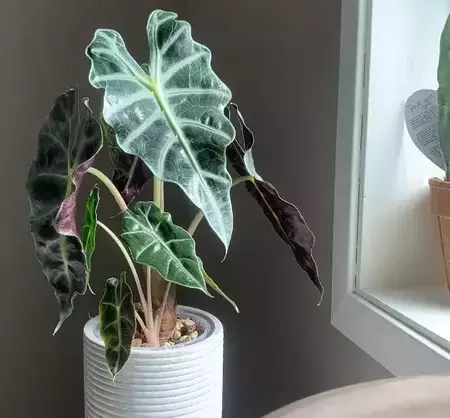

Humidity and Temperature Requirements:
Alocasia Polly loves humidity. Tropical rainforests are quite humid, exactly what Alocasia Polly will require at home. Always keep this plant’s soil moist, especially in summers. The easiest way to keep the soil moist is just spraying it with a spray bottle. Never let your plant’s soil get dried.
Recommended humidity level for Alocasia Polly is 60-75%. To maintain this level, you can adopt different methods; the easiest and most effective is using a humidifier.
While taking care of Alocasia Polly, how can we forget about temperature? Temperature is the most important factor you should consider while caring for Alocasia Polly. The recommended temperature for the Alocasia family is 65°F or slightly higher, but less than 65°F is not ideal for all Alocasias. Because this species’ natural habitat does not experience any cold weather, these plants can never withstand the cold weather.
Alocasia Polly will thrive in its ideal temperature and humidity, so keep these two factors in mind.

Soil Requirements:
Alocasia Polly requires an ideally moist soil condition. Soil should not be so dried, nor should it be too soggy. If you see water pooling in the soil, it is a very bad sign for your Alocasia Polly. You should ensure that your flowerpot has at least one hole for water drainage. The ideal PH range for Alocasia Polly is 5.5 to 5.6, which is acidic.
You should maintain this PH by mixing suitable soils for this family. As we know, this specie of plant needs a moderate amount of moisture, and the right proportion of suitable soils can help to maintain the moisture. You can combine regular indoor Potting soil with equal parts Perlite and peat moss to maintain enough moisture for well-draining soil.
Aroid potting mix can also be helpful for Alocasia Polly to maintain its moisture and aeration to the roots.

Repotting:
Alocasia Polly needs repotting every two years. All the plants of the Alocasia family are rootbound and have thick and congested roots. So, repotting is needed when these roots overlap each other. But this does not happen too frequently.
There are two major reasons for repotting for Alocasia Polly, the first is outgrown roots, and the other is lack of soil nutrients. After a few years, the soil loses its nutrients, so it is better to change the soil for this exquisite plant to grow properly.
Steps to Repot Alocasia Polly:

Propagation of Alocasia Polly:
Alocasia Polly grows from a central corm, therefore root division and corms are the best way to propagate this plant. The division is your greatest option to increase your plant number. As the plant grows in clumps, it is a simple task to separate and propagate them.
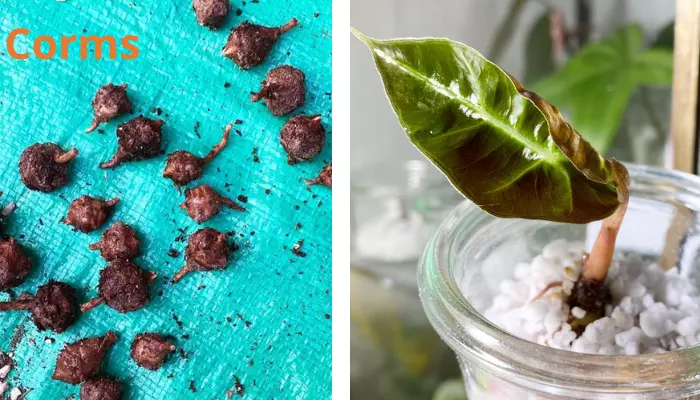
You can divide your Alocasia Amazonica Polly in the following ways:
They might give you a hard time growing initially, but eventually, they will keep growing normally.

Fertilizer
As we all know, a plant needs natural factors like sunlight, water, humidity, and temperature. But along with these natural factors, you will need a good slow-release or diluted liquid fertilizer for Alocasia Polly to grow quickly. Alocasias are big, quickly growing plants. The Alocasia Polly even blooms all year round. A lot of energy is required for these plants to grow so quickly. Although Alocasia Polly doesn’t require a large quantity of fertilizers, it still needs a moderate amount.
Liquid houseplant fertilizers are ideal for Alocasia Amazonica Polly. Please make sure to water the plant before feeding Alocasia Polly. Like other houseplants feeding the Alocasia Polly once a month will be enough in the summer or spring season. If your plant’s leaves turn brown from the edges, stop feeding your plant, especially in winters.

Maintenance:
Maintenance of Alocasia Polly is a simple process. It would help if you were careful about some factors and are good to go. Pruning is what you need to do occasionally for your Alocasia Polly not only to look presentable but also will help your plant to grow quickly.
Regularly cleaning the foliage is another activity that will maintain the gorgeous looks of Alocasia Polly and also prevent the development of pests. Please give some attention to this nature’s bounty, and then see how beautifully it will thrive throughout its lifetime.

Toxicity of Alocasia Polly
Yes, these beautiful-looking plants are indeed toxic for humans and pets. Alocasia Polly contains calcium oxalates, which can cause vomiting and irritation of the skin, throat and mouth when consumed.
So, it would help to be careful while working with these plants. You should keep your children and pets away from Alocasia Polly. If this incident happens and one of your children or pets consumes this plant, call your doctor and veterinarian for advice.

Pests Diseases & Common Problems
Pests
Unfortunately, these beautiful-looking leaves of this exquisite plant are the favorite food for pests and bugs. Pests can damage not only its leaves but the whole plant in a few days. So, get rid of them as soon as you see them. There are many bugs, but spider mites and mealybugs are the most common.
In this article, we have told you how important the right proportion of water for Alocasia Polly is; these bugs can also come with either inadequate water or excessive water.
Spider mites thrive on plants that have very dry soil. Similarly, mealybugs can be caused by overwatering or over-fertilization, so you must be careful while watering or feeding your plant.
The best method to remove these bugs is to place your plant away from other plants, so they don’t damage other plants, and then use a cotton swab and gently remove them from your plant.
Diseases
Root rot and rust are the most common diseases in the Alocasia family. Root rot is a fungal disease that can be caused by overwatering. In this disease, Alocasia Polly will gradually start shedding leaves, and leaves will turn out yellow. Root rot can kill a plant in a few days; by the time you realize it will be too late.
Rust is another common disease in Alocasia Polly. In this disease, yellow, orange, or red patches appear on the plant’s leaves and stems. The entire leaf could become brown or yellow before dropping off the plant. Plants that have damp leaf tissue are susceptible to rust.
Common Problems:
Most of the time, these problems may be resolved by increasing humidity, altering your watering routine, or transferring your plant to a different place with more or less light.
Brown patches on the leaves and leaves turning yellow are other common problems that Alocasia Polly faces. Yellow leaves on indoor plants are typically a sign of improper watering. Determine whether you are giving too much or too little water. Alocasia Polly generally requires a large amount of water.
You must ensure that the soil remains moist, especially when plants are actively growing in the summer, and you ought to water nearly every day.
Frequently Asked Questions
Q. Is Alocasia Polly a good indoor plant for newbies?
Alocasia Polly requires careful and good maintenance; thus, beginners shouldn’t attempt to start gardening with the Alocasia family. You might want to start with a simpler plant if you’ve only recently realized how much you adore houseplants.
Q. How to treat black spots on Alocasia leaves?
Black patches can grow over the entire leaf and seriously harm it. Therefore, eradicating them is critical before they spread across the whole leaf. Cutting off all contaminated sections to stop the spread of the infection is one of the finest ways to get rid of black spots on your Alocasia.
However, if the disease is still in its early stages, black spots can be eliminated using an appropriate bactericide.
Q. DO Alocasia Polly produce flowers?
Alocasia’ Polly’ frequently produces flowers when kept outside. However, it is less frequent in houseplants, and ideal circumstances must be present to encourage blooming. The alocasia ‘Polly’ variety produces “spathe” blooms, clusters of several little flowers. The flowers have an appearance like a peace lily.
Most people like to trim after these flowers are fully bloomed. This is because the flowers are not particularly attractive and need a lot of nutrients from the plant. A plant frequently loses one or two leaves while growing a flower.
Q. How can you awaken a dormant Alocasia?
Alocasias can go dormant, notably Alocasia Amazonica ‘Polly. If they are housed in too cold or dark conditions, a defensive reaction occurs. If your windowsills tend to get cold, they may occur throughout the winter.
A dormant Alocasia Amazonica Polly leaf will probably fall off, and the plant will stop developing. Even if it is reduced to little more than a corm in the ground, it is not necessarily already dead. You can provide warmth and appropriate water to your Alocasia Polly to bring dormant Alocasia back. Artificial light can also help in this situation.
Final Words
Despite how beautiful this plant is, it could be difficult for beginners to take care of Alocasia Polly. It requires a lot of attention; if you can give it your time, don’t hesitate to buy this exquisite plant that will catch the eye of your guests.
Nobody has a green thumb at birth! It’s not something you possess or lack. It requires time, knowledge, effort, and practice. Hopefully, this article will help you to grow your Alocasia Polly like a pro.
Happy Planting!!!
Related Posts
Alocasia Frydek Variegated Care and Propagation Guide
Alocasia Frydek Variegated is the most exotic, ultra-rare, and magnificent variety of the Araceae family, featuring an exquisite, stunning, luxurious velvety appearance that would leave anyone to fall in love with this beauty. This plant exhibits soft, velvety broad heart-shaped…
Alocasia Azlanii ( Jewel Alocasia) | Red Mambo Plant Care
Greetings, Lovely Gardeners, Did you know Alocasia Azlanii is a relatively new and world’s most sought-after jewel Alocasia due to its compact size and spectacular metallic foliage? Hopefully, like me, it is also your dream plant, and you adore its…
Alocasia Odora | Elephant Ear Plant Care Tips
Alocasia Odora is a breathtaking beauty and an evergreen perennial that can bring a tremendous look to your gardens and indoors. It is known for its impressive large lush green arrow-shaped leaves and sturdy stem. The distinctive feature of this…
Alocasia Longiloba | Watsoniana, Grandis, Veitchii & Longiloba Siver Care
Hello, fantastic plant parents! We are going to share the care guide of Alocasia Longiloba, another astonishing Aroid. Alocasia Longiloba is a tropical, tuberous flowering plant, another astonishing member of the Araceae family, to give a tropical feel to a…
Alocasia ‘Frydek’ | Green Velvet Alocasia Care Tips
Alocasia Frydek (Alocasia Micholitziana ‘Maxkowskii’) is an astounding and breathtaking member of the Alocasia family that has gained popularity over the last few years due to its flawless soft velvety foliage. This striking plant is known as Green Velvet due…







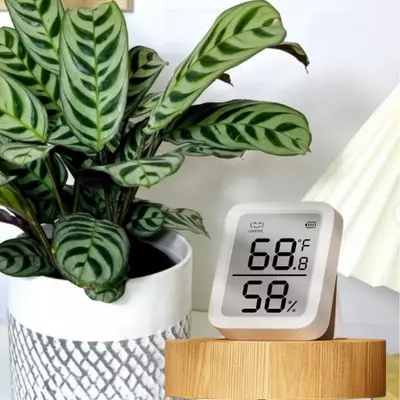

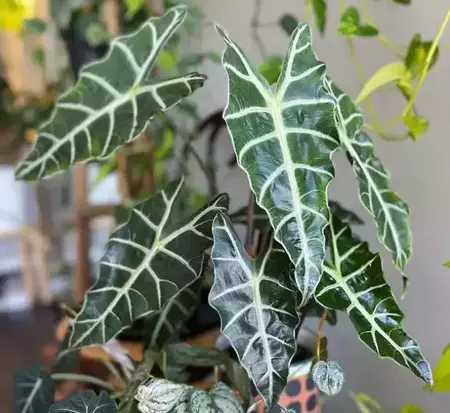
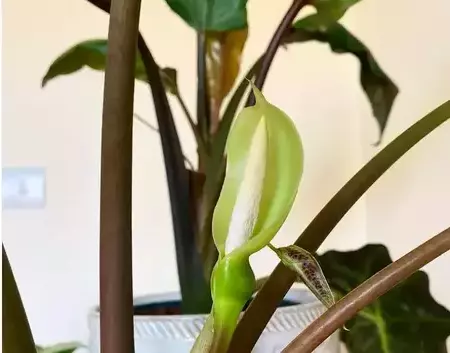
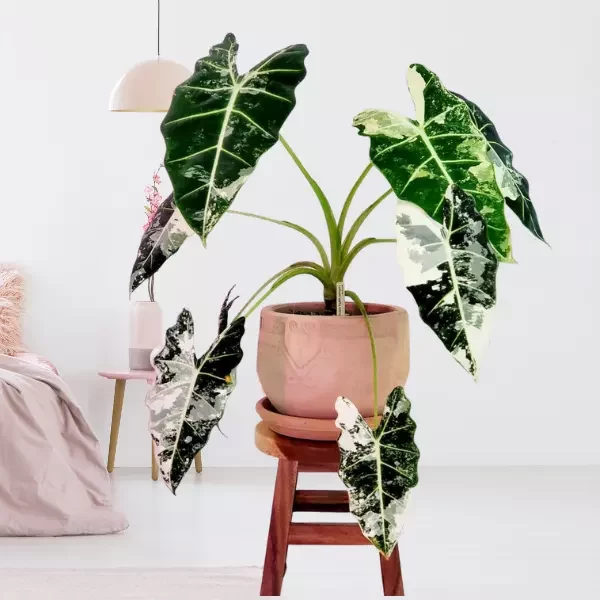
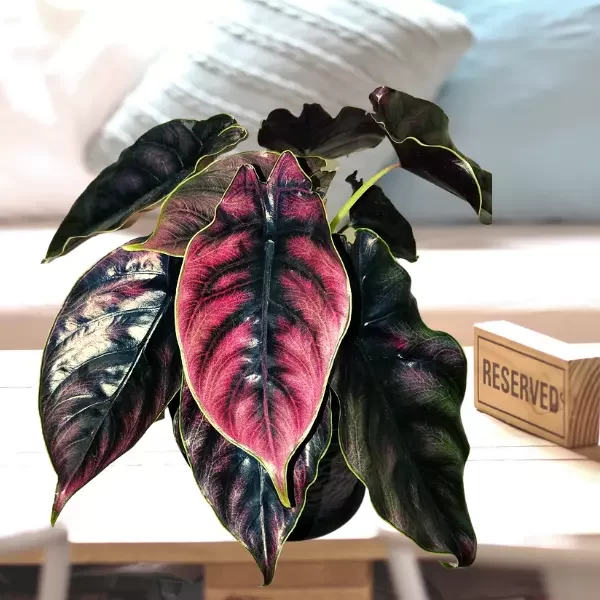
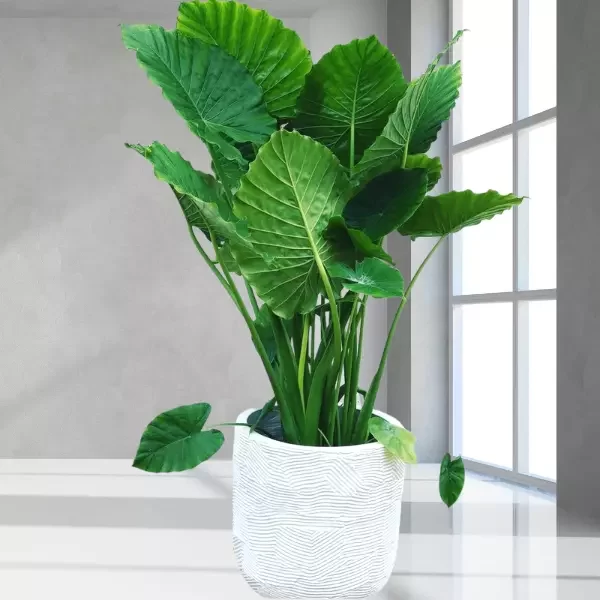
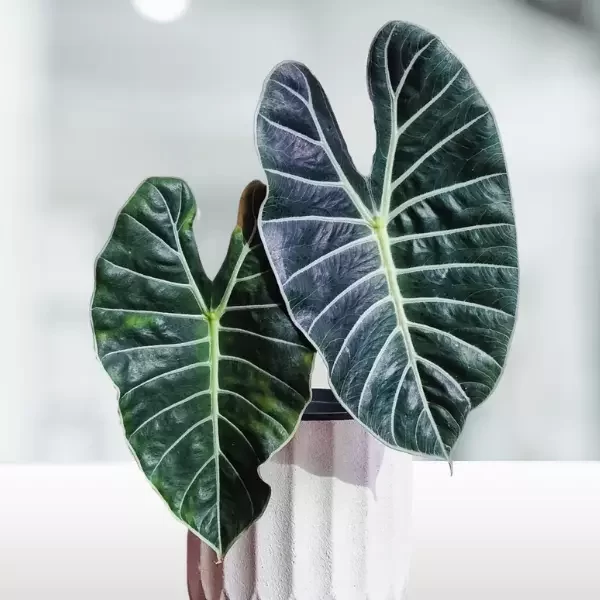
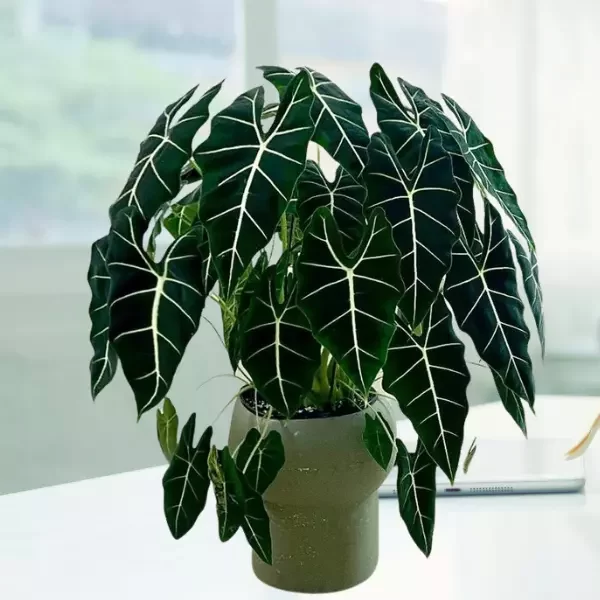
You ought to be a part of a contest for one of the best blogs on the web. I most certainly will recommend this site!
I went over this website and I believe you have a lot of good info, saved to bookmarks (:.